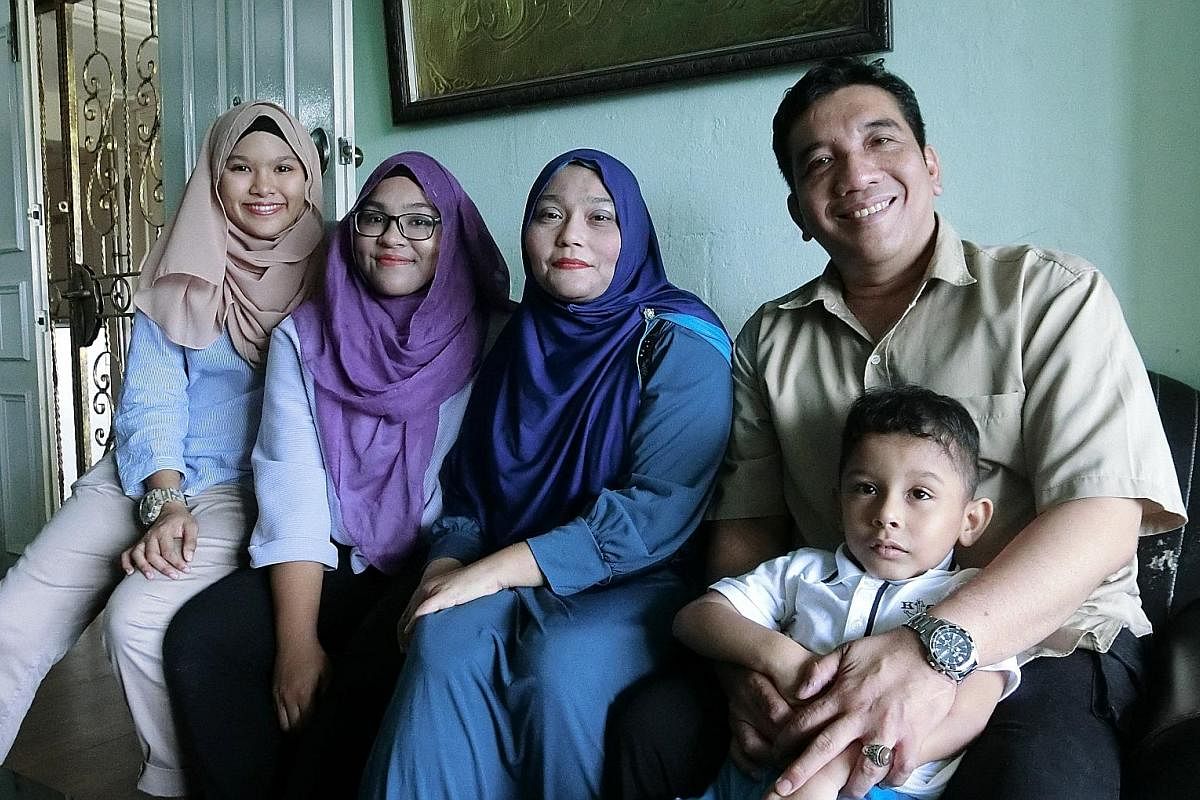-
Listen, understand and validate (L.U.V)
Here are some tips from Ms Sarah Chua, a parenting specialist at Focus on the Family Singapore, on healthy communication and conflict resolution within the family: • Listen attentively. Do not multi-task or use your mobile devices while a family member is talking to you.
• Understand the issue to unravel the other person's underlying needs and desires. Having the relevant facts often makes the right choice clear to everyone involved. Ignorance can cause a lot of damage. Fact-finding can help resolve disagreements.
• Validate the person and his feelings. Be more concerned about understanding his feelings and views rather than wanting to tell him what is right. Acknowledge his feelings so that he feels you understand him.
However, when the relationship between parent and child has broken down to a point where they are no longer able to communicate amicably on their own, it is helpful to have an objective third party, such as a counsellor, to mediate and facilitate healthy communication once again.
Bonding in bad times: Families grow closer through adversity
Some families grow closer during hard times


Not all families bond in good times. But some have ultimately forged closer relationships amid adversity and even estrangement.
Audrey, a 31-year-old photographer, and her mother have reconciled their differences after more than 10 years of keeping their distance from each other.
At the age of 12, Audrey started mixing with the wrong crowd.
"My friends were the whole world to me. I distanced myself from my family. I wanted to have fun and did not want to be controlled," she says.
She smoked and often drank alcohol at clubs, void decks and coffee shops. She got involved in fights. After a shoplifting incident at the age of 16, she stayed for nine months at Gracehaven children's home, which is run by The Salvation Army. After her O levels, she worked a variety of jobs in the retail and food and beverage sectors.
Her mother, Madam Lim, 56, says that she and her husband, a 59-year-old small-business owner, felt helpless as no amount of scolding seemed to deter her daughter, who often returned home late to avoid speaking to her parents.
"I couldn't control her. I felt guilty that I didn't know how to teach her (the right way to go)," says Madam Lim, who works part-time as a cleaner.
A family tragedy prompted a change of heart in Audrey, who, like her mother, does not want to be named in full.
When Audrey was 25, her 21-year-old sister was killed in a traffic accident.
"When my sister passed on, I realised I could not do things on my own anymore. I had been very self-sufficient," she says.
She recovered her lapsed Christian faith when she felt a sense of peace after a friend prayed with her during her bereavement.
"That was also the point when things changed at home. I started to treasure my parents more," Audrey says, adding that she realised then that her mother's love was unconditional.
Over the years, Madam Lim had been trying to communicate better with Audrey by attending parenting talks, asking her about current events in the news and giving her hugs, where previously she was undemonstrative. She also looked after the nine-year-old schnauzer that Audrey brought home one day, a pet dog she did not want and disliked initially.
Today, Audrey and her mother enjoy a closer relationship. Madam Lim says she was touched when Audrey posted a message on Facebook earlier this year, thanking her mother for her support despite her past behaviour.
Family experts say that two-way communication is key to reconciling differences within families.
Ms Sarah Chua, parenting specialist at Focus on the Family Singapore, reminds parents of adolescents: "Nagging and criticism won't change your teen. If you honour your teen by treating her as special and valuable, it will motivate her to live according to the values and boundaries your family has set."
Conversely, she advises teenagers to keep the lines of communication open: "The way to get a parent to ask fewer questions is to offer information. Tell your parents what is happening in your life. Don't talk to your parents only when you need something."
Mr Edwin Yim, director of AWWA Family Service Centre, says the foundation for resilient relationships that can withstand difficulties and calamity should ideally be laid in early childhood.
He adds: "It is important for parents to set aside time for their children every day. For example, working parents can ask their children about their day over dinner or at bedtime. In addition, parents should not be quick to reprimand or punish their child if they make a mistake.
"There is no one-size-fits-all approach. Parents and children must establish mutual trust and find strength in unity."
When troubles strike, it can be challenging to maintain good communication.
After housewife Nuraida Salim lost her right leg to diabetes last year, relationships in her family were strained.
"People saw us smiling, but it was chaotic. I used to be active and independent, but I couldn't even go to the kitchen to get a drink for myself," says Madam Nuraida, 42, who had to leave her job as a kindergarten teacher six years ago because of the illness.
Two of her three children, Ms Aqilahtul Syahirah, 18, and Ms Aqidahtul Batrisyia, 14, have had to learn to be more independent during the years when an infected wound in her right foot impaired her mobility, by doing more household chores and taking their mother to the clinic for check-ups. Her youngest child is four years old.
Then came the amputation below her right knee last year, which cranked up the strain on the family.
The stress of dealing with her disability made her "more hot- tempered", Madam Nuraida says, though she empathised with the adjustments her family members also had to make.
Elder daughter Syahirah, for instance, was starting work as a trainee dental surgery assistant at the time and it was difficult for her to take time off to care for her mother.
Younger daughter Batrisyia sometimes had to leave school a few hours earlier to help her mother care for her youngest child, Akhdan Alkauthar, who has autism and ADHD (attention-deficit hyperactivity disorder).
The daughters say they have a stronger bond now.
Ms Batrisyia says she prioritises her family more: "We came to an understanding that we had taken our mother for granted, for instance, in doing the chores, cleaning the bathroom and cooking. We learnt to support one another."
Ms Syahirah adds: "I find my mother very strong. I want her to keep fighting on."
Sometimes, however, reconciling with one's children can take years.
This was the case for Madam Noorlinda Omar, 44, an ex-offender who started taking heroin at the age of 14, out of curiosity. She found that the drug made her forget the feelings of abandonment she faced after her parents, who divorced when she was nine, left her in the care of her grandmother.
From the mid-1990s to the early 2000s, Madam Noorlinda was in prison for three spells, between a few months and a few years each time, for drug consumption. Her children, now aged between 12 and 28, were cared for by relatives most of this time.
It was about 13 years ago, before her fifth child was born, that she resolved to turn her life around.
"I wanted to change. I did not want to be separated from my children again. Also, so many of my ex-convict friends, who had taken drugs, had passed away. I was scared," says Madam Noorlinda, who is married to a manager in the nightlife industry.
Rebuilding relationships is often challenging for ex-offenders, who commonly face issues of not being trusted and accepted by their families, says Mr Elvis Overee, deputy director of Industrial and Services Co-operative Society Limited, known as Iscos, which supports ex-offenders and their families.
"Due to their past mistakes, lifestyle and incarceration, ex-offenders were often absent from their families. As they were not present during the children's growing-up years, the (ex-offender) parents typically do not enjoy the love and affection of the family. They also may not understand the needs and behaviours of their children," he says.
"The ex-offenders need to understand that reconciliation does not happen overnight and effort is needed to gain the trust of their children."
Madam Noorlinda, who is a housewife, says: "I wanted to make it up to my children. I try and shower them with love."
She takes her two youngest children, aged 18 and 12, out to swim or watch movies, and on family trips to Malaysia and Thailand.
The fourth of Madam Noorlinda's five children, Ms Nur Atiqah Amran, 18, who is attending a nursing course in polytechnic, says her mother had been largely absent until she was a 10-year-old in Primary Four. But she feels this absence did not matter fundamentally as she was still young when her mother returned for good and she was well cared for by her grand-aunts.
Ms Atiqah says of her mother: "I appreciate that she has changed. She is here now. She supports us and encourages us to do well.
"The past is past. I may not have memories from before, but I can create memories with her now."
Join ST's Telegram channel and get the latest breaking news delivered to you.
A version of this article appeared in the print edition of The Sunday Times on May 14, 2017, with the headline Bonding in bad times: Families grow closer through adversity. Subscribe

